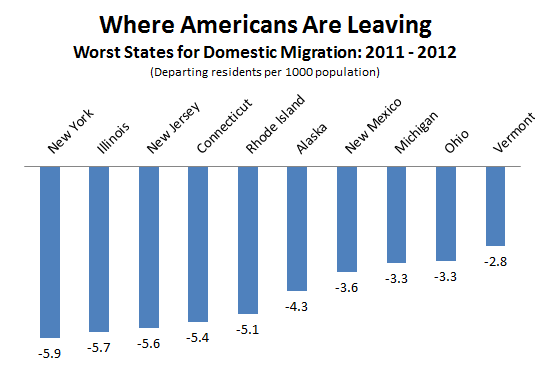Fourteen States With Worst Absolute Out-Migration From July 2011 to July 2012 All Lack Right to Work Laws


The 10 states shown here had the most severe net domestic out-migration from July 2011 to July 2012 in percentage terms. Not one has a Right to Work law. Image credit: theatlantic.com
Late last week, the U.S. Census Bureau issued a report showing a continuation of the massive exodus of employees and their families from forced-unionism states. This is an exodus that the Census Bureau has documented ever since it began tracking state-to-state domestic migration during the 1990’s.
In the very latest year for which data are available, from July 1, 2011 through July 1, 2012, a net total of nearly 415,000 Americans moved into one of the 22 Right to Work states from elsewhere in the U.S. (Since Indiana and Michigan did not pass their Right to Work laws until February and December 2012, respectively, they are not counted as Right to Work states in this analysis. Indiana, which switched its status during the period reviewed, is excluded. Michigan, which did not adopt a Right to Work law until after the period ended, is counted as a forced-unionism state.)
Not one of the 14 states (New York, Illinois, New Jersey, California, Ohio, Michigan, Connecticut, Pennsylvania, Missouri, Wisconsin, Massachusetts, Minnesota, Maryland, and New Mexico) suffering the worst net out-migration, in absolute numbers, to other states had a Right to Work law on the books as of 2011. In contrast, seven of the eight states with the greatest net in-migration have Right to Work laws.
In a blog post for The Atlantic (linked above), Jordan Weissman lists “gentle taxes” and “booming job markets” as two of the three key factors inducing Americans to move to the high net in-migration states. It’s only logical that Right to Work status would be closely correlated with both these factors, since Big Labor is by far the most powerful lobbying machine for higher taxes and heavier regulation of business in America. And of course it is far easier for union bosses to get everything they want in states where they wield forced-dues privileges. The third factor, “sunshine,” is of course not influenced by Right to Work laws, but it seems to be less important. For example, in absolute terms, two of the 14 states with the greatest net out-migration over the past year are sunny, but forced-unionism California and New Mexico.

